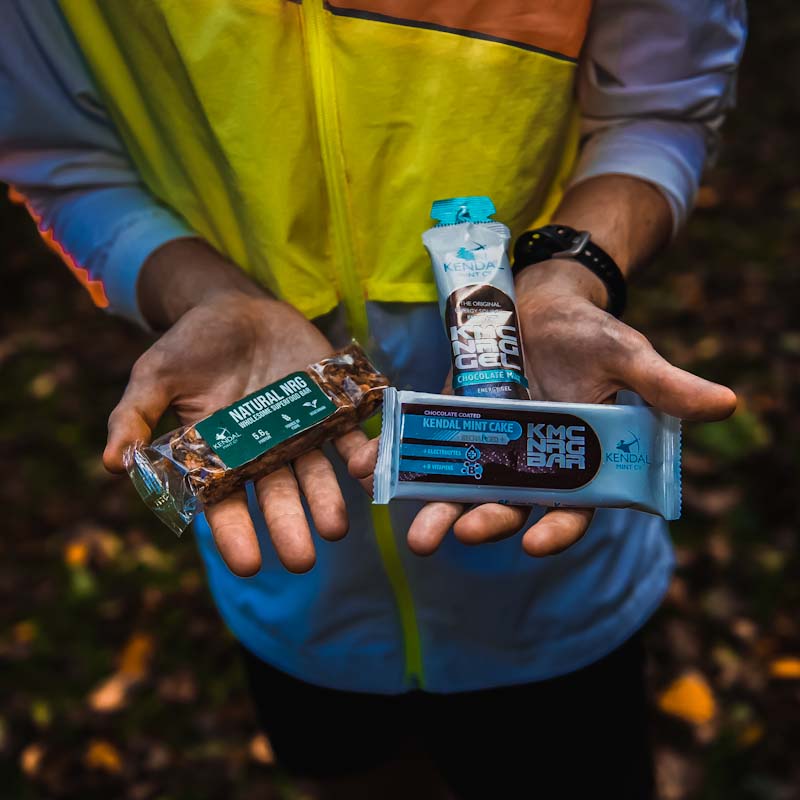Here's our top tips on how to fuel and use sports nutrition products in your marathon training program or when running an ultra marathon.
Fueling right starts long before your run
It's easy to get your fuel right during your run but actually, fueling right starts during training and finding the fuel that works best for you! It's especially important to begin fueling right the day before as this can have a huge impact on your performance, especially if you're race starts first thing in the morning...
You're probably familiar with the term "Carb-loading". Which is important especially if you're racing for longer than 90 minutes. You want to build up your muscle Glycogen levels, so eating little & often ensures you maintain full energy stores throughout the day.
The key is to play it safe, stick to what you know, simple and easy to digest foods. Remember, race day isn't about the weight-loss which you've likely achieved during training. You want to arrive at your even fully fueled for optimal performance.
Hydrate well.
Top tip: You can measure how well hydrated you are from the colour of your urine! You should aim for a light straw colour and if you're passing fluids fast, increase your electrolytes intake.
Read more about electrolytes and follow our urine chart here.
By staying well hydrated throughout the day it means you have less to worry about the next morning, it's easy to become dehydrated over night! You can top up your electrolytes using KMC ISO MIX here.
Stay clear of any new or risky foods..
..particularly spiced. It's also a good idea to avoid too much fibre. Excess fibre can slow down your digestive system and affect your performance.
Make sure your get a good nights rest!
Not necessarily food related but you can't beat a quality night of rest before a race. Try to manage how much liquid you take in right before bed.
Some find that drinking Peppermint or Chamomile tea helps to relax and breathe easier for a more whole nights sleep.
Try the rule of thirds
A really simple way to eat smart before your event is to divide your plate into thirds. 1/3 Carbs, Protein & Veg. If you're going to be working for a longer period of time, up your carbohydrate intake!
You can get some extra protein from our delicious KMC PRO MIX here.
Pre-Run Breakfast & Snacks
While many people focus on what they should eat after a run, pre-run nutrition is just as important.
Eating an easily digestible breakfast before you head out for your run gives your body fuel it can burn immediately—along with key nutrients such as carbohydrates and electrolytes.
Aim for about 2-4 hours before your run for a healthy breakfast that includes carbs and hydration; think whole grains (oatmeal, a bagel) and water.
Also keep in mind that while bananas are a good source of potassium, they also contain sugar, which could make you feel bloated during your run. And while yogurt may seem like a natural choice, it's also loaded with lactose—the carbohydrate in milk that makes some runners gassy and uncomfortable during their runs.
When in doubt, stick to oatmeal or opt for something savory like eggs.
How much?
Generally speaking, you should be looking to consume between 1-2g of Carbohydrate per kg of body weight.
This can vary depending on your event. If you're running an ultra, somewhere near the top end.
If you're cycling a sportive, more like somewhere in between.
Our simply delicious superfood bar makes for a great addition at breakfast with 40g of Carbohydrate and 5.6g Protein here.
Endurance athletes should also take on ample amounts of Protein as well as Carbohydrates! Roughly 20-40g of protein every 3-4 hours helps to maintain lean muscle mass and adaption.
If your event lasts more than a few hours, you'll need to make sure you consume some protein with breakfast too. Try adding some KMC PRO MIX to your breakfast here.
If you're going to be running more than 90 minutes at a time, consider bringing along sports drinks such as KMC ISO MIX instead of water since plain H2O won't provide enough carbs to keep up energy levels throughout your workout. You can also take a range of energy gels and bars.
Use Coffee (caffeine) to your advantage..
..but with caution. Scientifically proven to improve muscular endurance (the amount of times your can repeatedly use the same muscle over long periods of time) and alertness, as well as reduce fatigue.
However, Caffeine's diuretic properties will make you lose water - The best way to avoid this is to drink at least two glasses of water for every cup of coffee or other caffeinated beverage.
Read more - Caffeine: The Secret Weapon for Endurance Athletes?
Gels, Chews and Energy Bars
Energy Gels and chews are ultra-convenient sources of energy that most runners use during long runs, races and ultras. These snacks are loaded with easily digestible carbohydrates; they're also packed with electrolytes like sodium and potassium that help you keep your hydration levels up.
The upside is that these products are designed for easy digestion on the run; however, many runners find them too sweet for their liking and aren't crazy about carrying a sticky mess in their shorts pockets for hours. If you fall into either camp, there's an alternative: energy bars.
Read more: "Is Kendal Mint Cake Good for Running?"
Read more: "Why do some energy gels hurt my stomach?"
Read more: "Energy Gels - What are they and should I use them?"
An example: A Marathon, 26.2 miles
26.2 Miles of running
Approx 4 hours
Target 60g Carbohydrate per hour
What might this require? As an example you might take:
Pre-run:
- 1x KMC ISO MIX Isotonic Drinks mixed with 500ml water (34g Carbohydrate per bottle)
- 1x Natural NRG Bar (up to 54g Carbohydrate & 6g Protein)
- 1x KMC NRG GEL+ Caffeine Energy Gel (27g Carbohydrate & 100mg Caffeine)
During Run:
- 6x KMC NRG GEL (27g Carbohydrate/ Gel) - 1 GEL every 40 mins
- 3x KMC NRG BAR (35g-85g Carbohydrate) - 1 Bar every hour
-
2x KMC ISO MIX Isotonic Drinks mixed with 500ml water (34g Carbohydrate per bottle) - Sip continuously.
(If you're good with caffeine replace 3 standard gels with 3x KMC NRG GEL+ Caffeine Energy Gel (27g Carbohydrate & 100mg Caffeine))
Post Run:
Make sure to have our KMC NRG GEL on hand. Our energy gels are the most easy to take product whilst on the move.
The Dual Charge Carbohydrate Formula provides your body with an instant but long-lasting energy boost. They come in a variety of powerful and refreshing flavour, and they're kind on the stomach.
For an extra Supercharged kick, try the KMC NRG GEL+ with 100mg of caffeine.
"Why do some energy gels hurt my stomach?"
Fatigue When Running
If you're running a marathon or ultra and feel your energy waning after a certain distance, it's likely that you're not in a calorie deficit. Consuming adequate calories while training will help you keep your energy up and allow you to run longer distances without hitting a wall.
Aim for consuming 250-500 extra calories per day beyond what you would normally eat if you're aiming for these long-distance feats.
Sports Drinks
Rehydrate with Sports Drinks and Rebuild with Carbs. When you exercise hard for more than 60 minutes (or if it's a hot day), you lose electrolytes and are at risk of dehydration—and your performance can suffer as a result.
What's more, strenuous exercise without proper rehydration can lead to hyponatremia (low blood sodium), which is caused by drinking too much water without adequate electrolytes.
To rehydrate after your run, make sure you're using an isotonic sports drink such as KMC ISO MIX that contains carbohydrates and electrolytes like sodium; otherwise your recovery could be slowed or halted.
Check out these helpful guides on Isotonic Hydration and Carbohydrates and Electrolytes for Recovery to learn more.
What to eat After the Race
For many runners, carbohydrates are their go-to fuel source. But runners also need protein to repair and rebuild muscles; fat is a primary energy source during long runs (over 90 minutes); and electrolytes like sodium play a vital role in hydration.
While there's not a set formula for when and how much of each macronutrient you should consume after your run (after all, it depends on your running time and what type of food you're eating), there are some best practices.
Why do I need to recover properly?
A proper recovery nutrition plan will allow your muscles to adapt after the strains you have just put on them during your race, as well as improving your future performance.
Do this consistently to keep your body in optimum condition.
What should I eat after my race?
At least 20g of quality Protein and fast acting Carbohydrates. So something which contains a good balance of both, ideally in a ratio of around 4:1 carbs-protein.
An effective way to get a quality source of both Protein and Carbohydrate into your diet, is from our KMC PRO MIX (It's like eating a choc mint milkshake) with 21g of Whey Protein.
It's also a good idea to replenish your electrolytes, if you've done this well throughout your race that's great but if you've been going for longer than an hour it's really important to restore your fluid balance, our KMC ISO MIX is a great solution. Read more about the importance of electrolytes here.
*Don't go nuts and indulge straight away* Eating high-fat foods like a burger will slow down the digestion of post-race carbs and impede your recovery process. You should allow yourself time to celebrate and indulge but give it a few hours beforehand!
Don't forget your post-race snack either - cheers, hugs, hustle and bustle can all distract you but if you don't refuel asap you'll feel worse for the rest of the day.
When should I eat after my race?
Try to make sure you start your refuelling and rebuilding process as soon as you can. Make sure you consume a good recovery meal within 2 hours of finishing.
It all depends on the length and intensity of your race but the sooner you start refuelling, the sooner the recovery process begins.
When it comes to protein intake, research has demonstrated that your body is particularly receptive to protein for a couple of hours after exercise. This is commonly known as the "anabolic window".
Not only will taking protein after a workout maximise recovery, it also means that you've got the rest of the day to fit in the rest of your good food. "Why is protein the key to recovery?"
Protein Shakes After the Race
If you're running a marathon or other endurance event and are looking for healthy nutrition after you cross that finish line, consider reaching for a high-protein recovery shake such as KMC PRO MIX. High in Protein and Carbohydrates, and tastes just like a chocolate mint milkshake - The perfect combination for muscle repair and hydration (especially because it's pretty easy to digest).
Read more: "How to optimise your post-workout recovery"


